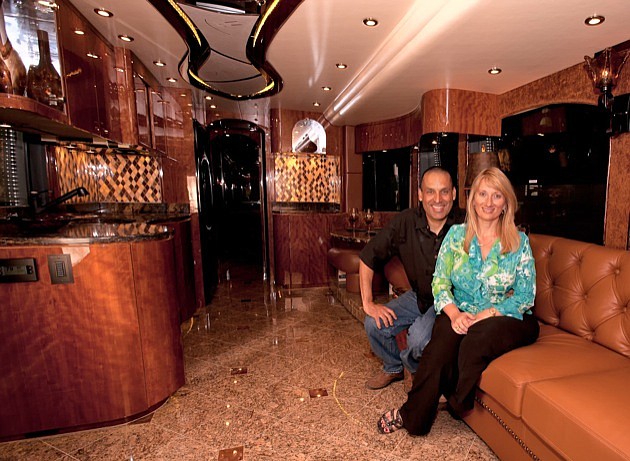- November 26, 2024
-
-
Loading

Loading

Evelyn Figueroa found herself in a difficult situation just days after she and her husband, Nelson, started their business.
Her first customer provided her with a $10,000 check, but she couldn't find a bank that would open a business account and give her enough cash immediately to help her launch the business.
“I must have gone to 10 banks before I found one that would work with us,” she says. “I wasn't going to give up until I found one.”
That determination — and the decision to run a lean company with little debt — is what has helped the Figueroa's company, Millennium Luxury Coaches, steadily increase profits during a time when other luxury coach manufacturers have closed their doors. From 2008 to 2010, the company increased its profits by a combined 68%, and in the past year it has doubled its workforce to 65 employees.
The Figueroas build high-end custom motor coaches that start at $1.5 million and can sell for as much as $2.2 million.
Nelson Figueroa started in the U.S. Army, where he replaced avionics in helicopters. After leaving the military, he spent several years designing and installing electronic systems in luxury yachts before joining Featherlite to do similar work on motor coaches.
Shortly after leaving Featherlite in 2000 to do consulting work, Nelson Figueroa was approached by the owner of Millennium Luxury Coaches, who wanted his expertise to build custom buses.
“It was an opportunity we had never thought about, so we jumped at the idea. If we had thought about it for too long, I don't think we would have done it,” he says.
The Figueroas didn't want to take on debt to launch their business, so they negotiated a deal with the owner where he would pay them a $10,000 deposit, buy the bus shell and pay the Figueroas as they hit specific milestones in the construction of the coach.
Evelyn Figueroa found suitable garage space and worked out a payment plan based on the first $10,000 check and their draw schedule from the motor coach company.
She also negotiated payment plans with vendors when she could, but most wanted certified checks at the time materials were delivered. “We hadn't been in business, so they were reluctant to give us credit,” she says.
In addition to not taking on any long-term debt, the Figueroas were equally adamant about paying their bills on time. “That was a big deal in getting our vendors to trust us,” says Nelson Figueroa. “We knew we could not continue to grow without the help of our vendors.”
Eventually, their plywood vendor was the first to give the Figueroas a credit line — of $1,000.
“It wasn't a lot, but it did help us leverage our other vendors into giving us credit,” she says.
By 2003, the Figueroas were building three to four coaches per year and decided they wanted to own Millennium Luxury Coaches outright. Using the same bare-bones tactics they used to start the company, Evelyn and Nelson agreed to build two custom coaches at no profit in return for control of the company.
“Our whole approach to business is to stay lean, find creative ways to build our business and always be on the look out for opportunities,” Evelyn Figueroa says.
In 2007, an opportunity presented itself. At the time, the motor coach business was booming and Millennium faced eight competitors. The company was building 10 to 12 coaches per year and there was pressure to keep up with other companies in the industry, who were ramping up production in anticipation of growing sales.
Instead, Nelson decided to keep production levels steady but adopt new technologies. To that point, coaches were built with only two slide-out sections. New manufacturing techniques would soon allow coaches to be built with up to four slide-out sections, which would increase their interior space.
“All the other companies knew this technology was coming. We decided since we're the smallest and youngest company in our industry, we would set ourselves apart by adopting this new technology first,” says Nelson.
It was a good decision. As Millennium's competitors were increasing their orders for the old-style coach shells, some of which cost up to $500,000, demand began to plummet in the second half of 2007. Millennium had already stopped buying shells in anticipation of the new models. By 2008, Millennium's competitors were stuck with extra inventory that was outdated.
“For about 18 months, we were the only ones in the industry offering the new style,” says Nelson.
The company also hedged its bets on the recession by broadening its services. Paint and body repair and interior renovations on older models helped the Figueroas reach more customers.
In addition, Evelyn and Nelson tripled the number of trips to attend rallies and events. Getting out on the road raised the company's profile and helped the couple reach potential customers.
Their plan worked, as the couple saw a 54% jump in profits from 2008 to 2009, which helped fuel growth. So far in 2010, Millenium's profit numbers are up 20%.
Millenium recently moved into a 100,000-square-foot facility. At this point, the biggest challenge is finding reliable and skilled workers, says Evelyn Figueroa.
“We've made it through the last three years by running a lean business. That helps us stay flexible and stay a step ahead,” she says.
Evelyn Figueroa got her start in business early. She was 8 years old.
She would secure jobs from neighbors, from dog walking to leaf raking. Then she would sub out the actual work to her friends at a much lower price, much like Tom Sawyer.
“When their mothers found out, they wanted to to explain the concept of fairness. I wanted to tell them the concept of business,” Evelyn says.
At age 12, she started her own cleaning company, this time doing the work herself.
“The hardest part was getting rides because I couldn't drive until I was 16,” she adds.